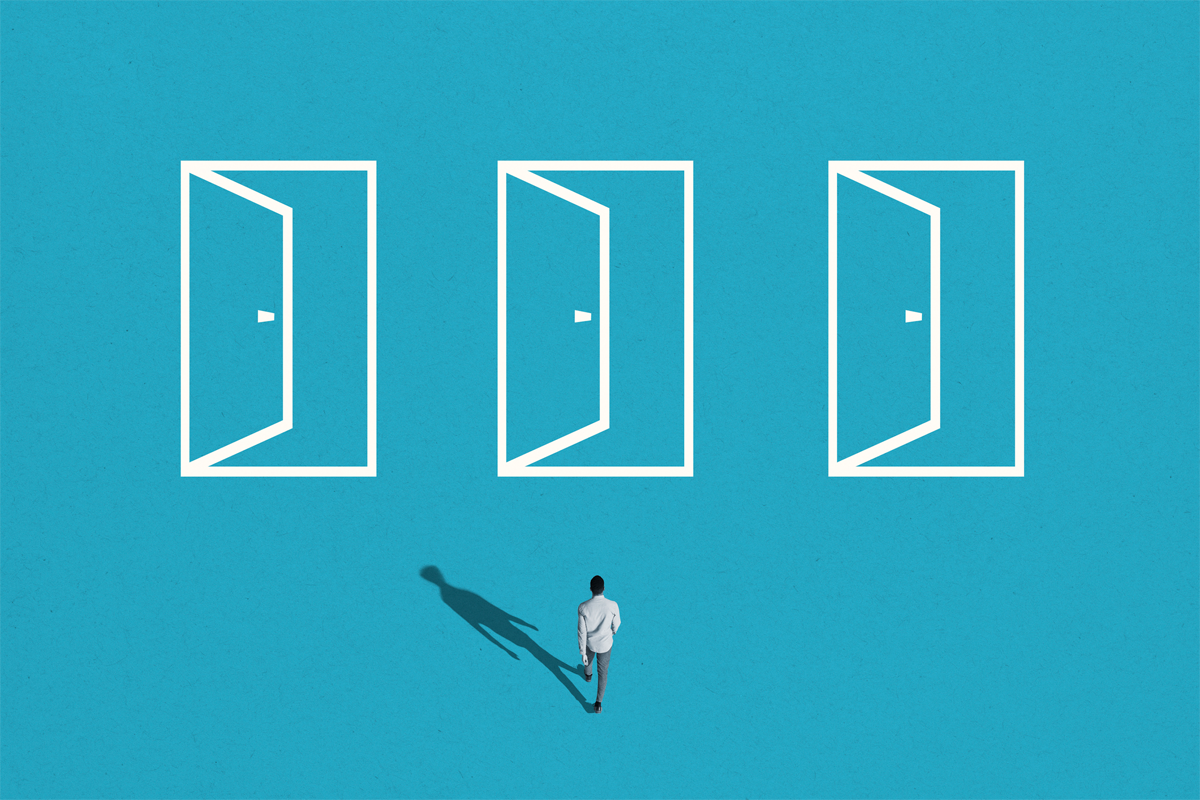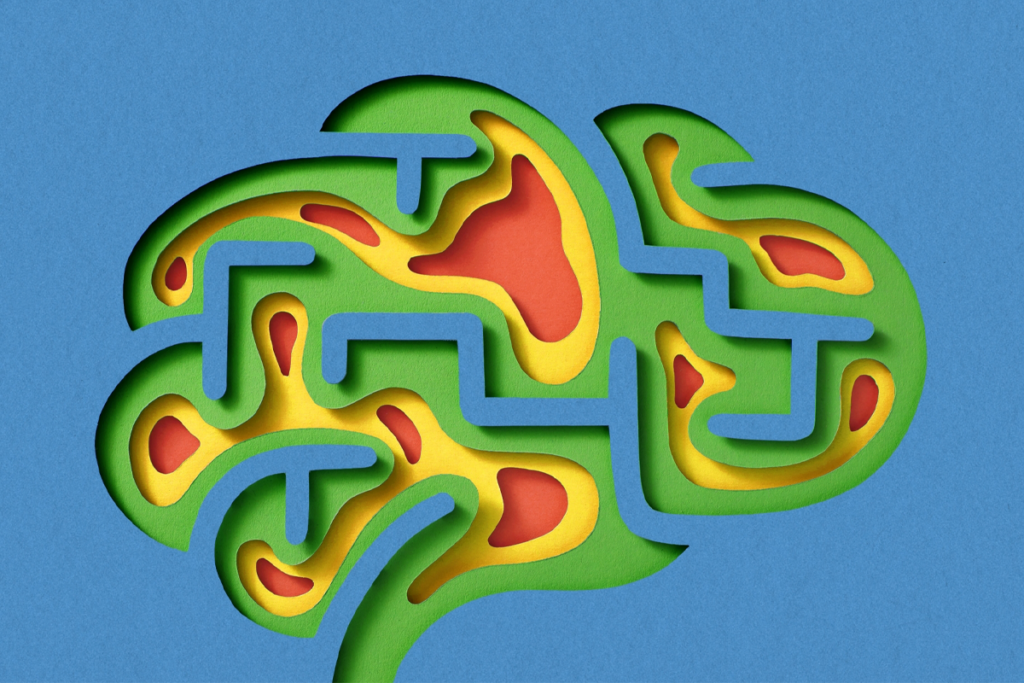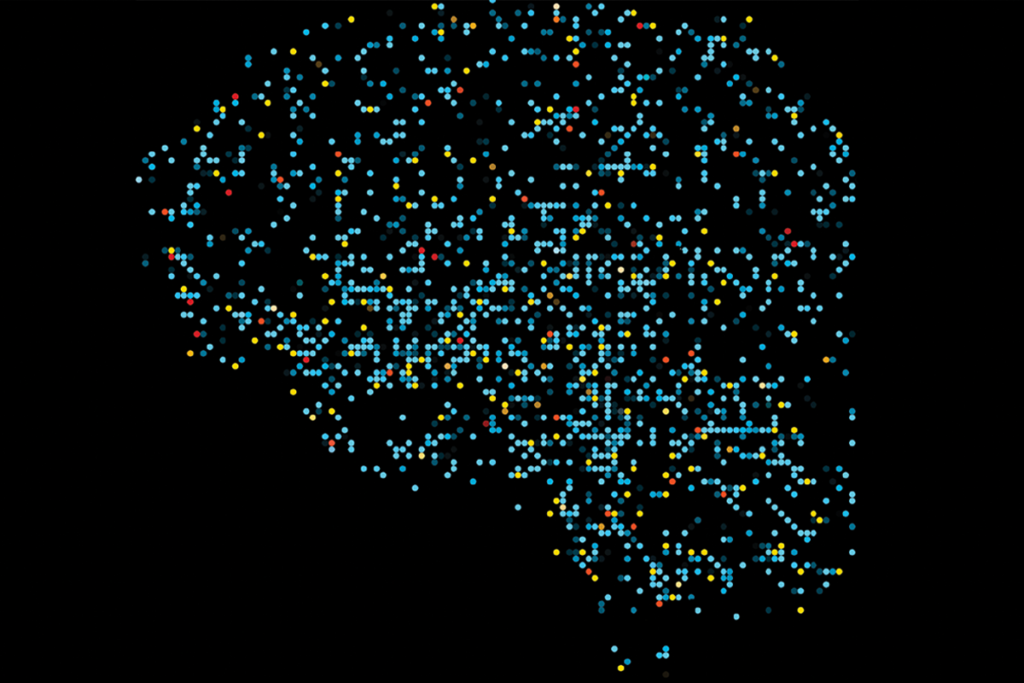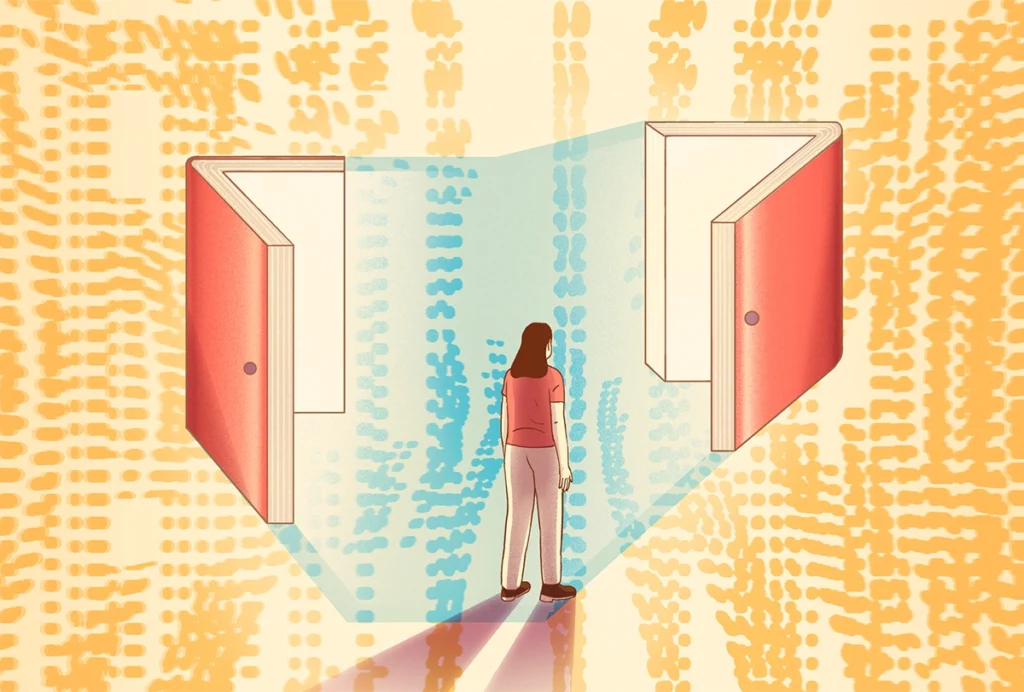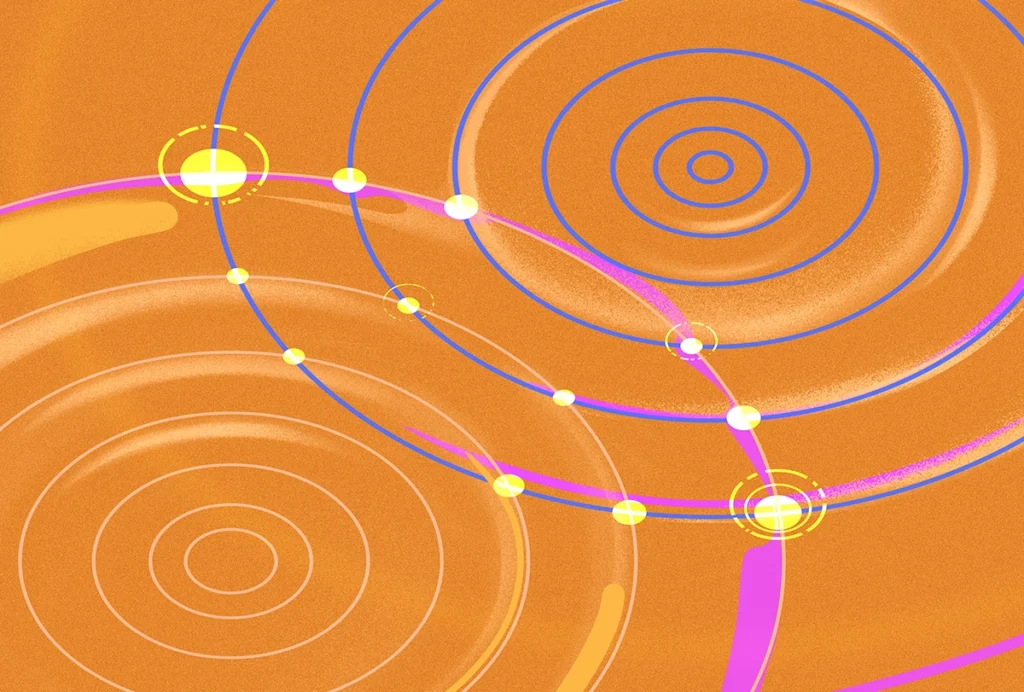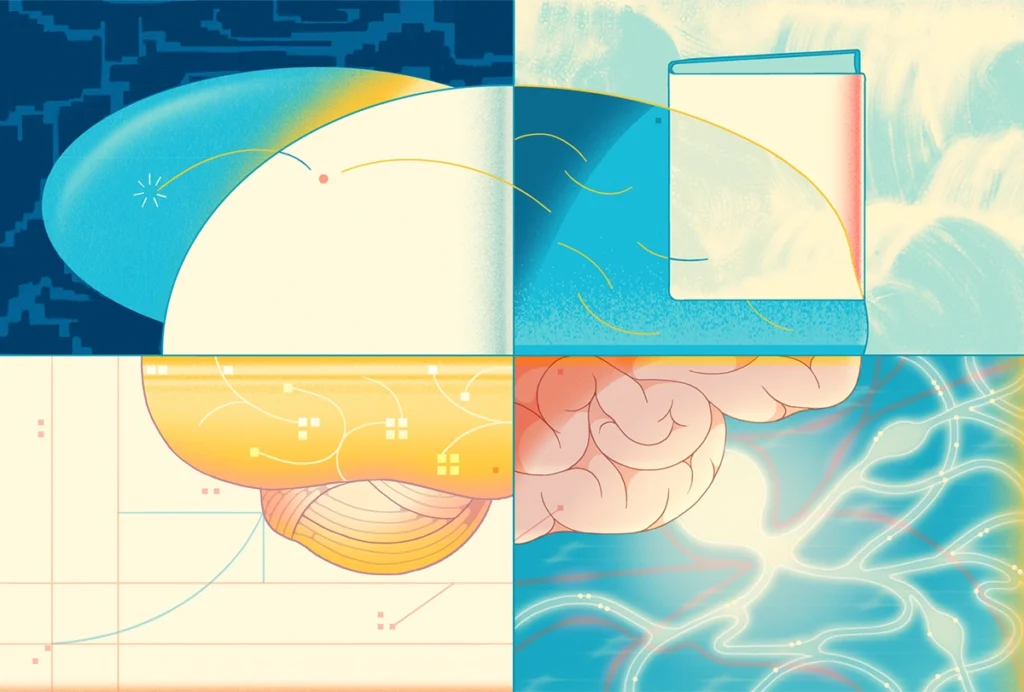Are we the authors of our own stories? Or is our apparent freedom of choice really an illusion? These questions were brought home to me recently as I was watching my son play a video game — one where you wander around an open world, meeting interesting denizens of one type or another (and killing quite a few of them). As I watched, his character entered a tavern and approached the bartender, who offered a generic greeting. The game then threw up some options for things you could say in reply to get information about the prospects for fortune and glory in the surrounding territory.
In this exchange, my son’s possibilities for action were limited by the game, but he was really making choices among them, and these choices then affected how the conversation went and what would subsequently unfold. His decisions were based on his overall goal in the game, the tension between his goals of taking some immediate action or to keep exploring, his need to have enough information to make a decision with confidence, the risk of biting off more than he could chew and losing his hard-won stuff: All these considerations fed into the decisions he made. He had his reasons and he acted on them, just like you or I do every day, all day long.
The bartender, in contrast, was not making choices. He was a classic “non-player character,” an NPC. His responses were completely determined by his programming: He had no degrees of freedom. His actions were merely the inevitable outcome of a flow of electrons through the circuits of the game console, constrained by the rules encoded in the software. Even the more sophisticated NPCs in the game, including the monster that eventually caramelized my son’s avatar, were similarly constrained. The monster’s actions — even in the fast-moving melee — were determined by the software programming and mediated by the electronic components in the console.
Thus the NPCs only appear to be making choices. They’re not autonomous entities like us: They’re just a manifestation of lots of lines of code, implemented in the physical structure of the computer chips. Their behavior is entirely determined by the inputs they get and their preprogrammed responses. We, in contrast, are causes of things in our own right. We have agency: We make our own choices and are in charge of our own actions.
At least it seems that way. It certainly feels like we have “free will,” like we make choices, like we are in control of our actions. That’s pretty much what we do all day — go around making decisions about what to do. Some are trivial, like what to have for breakfast; some are more meaningful, like what to say or do in social or professional situations; and some are momentous, like whether to accept a job offer or a marriage proposal. Some we deliberate on consciously, and others we perform on autopilot—but we still perform them. Of course, our options may be more or less constrained (or informed) by all kinds of factors at any given moment, but generally we feel like the authors of our own actions.
And we interpret other people’s behavior in terms of their reasons for selecting different actions — their intentions, beliefs and desires that make up the content of their mental states. We constantly analyze each other’s motives and habits and character, looking for explanations and predictors of their behavior and the decisions they make. Why people act the way they do is ultimately the theme of most entertainment, from Dostoyevsky to Big Brother. All this rests on the view that we are not just acted on — we are actors. Things don’t just happen to us, in the way they happen to rocks or spoons or electrons: We do things.
The problem is that if you think about this view for too long, it becomes difficult to escape a discomfiting thought. After all, like the NPCs, our decisions, however complex they may be, are mediated by the flow of electrical ions through the circuits of our brains and thus are constrained by our own “programming,” by how our circuits are configured. Unless you invoke an immaterial soul or some other ethereal substance or force that is really in charge — call it spirit or simply mind, if you prefer — you cannot escape the fact that our consciousness and our behavior emerge from the purely physical workings of the brain.
There is no shortage of evidence for this from our own experience. If you’ve ever been drunk, for example, or even just a little tipsy, you’ve experienced how altering the physical workings of your brain alters your choices and the way you behave. There is a whole industry of recreational drugs — from caffeine to crystal meth — that people take because of the way that physically tweaking the brain’s machinery in various ways makes them feel and act. The ultimate consequence in some cases is addiction — perhaps the starkest example of how our actions can sometimes be out of our control.
And, of course, if the machinery of your brain gets physically damaged — as occurs with head injuries, strokes, brain tumors, neurodegenerative disorders and a host of other kinds of insults — or its function is impaired in other ways, as in conditions such as schizophrenia, depression and mania, then your ability to choose your actions may also be impaired. In some situations, the integrity of your very self may be compromised.
W
e all like to think that we are Player One in this game of life, but perhaps we are just incredibly sophisticated NPCs. Our programming may be complex and subtle enough to make it seem as if we are really making decisions and choosing our own actions, but maybe we’re just fooling ourselves. Perhaps “we” are just the manifestations of genetic and neural codes, implemented in biological rather than computer hardware. Perhaps we are the victims of a cruel joke, tragic figures in the grip of the Fates. As Gnarls Barkley sang, “Who do you, who do you, who do you think you are? Ha ha ha, bless your soul, you really think you’re in control.”It’s hard not to look at the growing body of work from neuroscience and see only the machine at work. Driving this circuit or that one either directly causes an action or influences the cognitive operations that the animal — mouse or human or anything else — uses to decide between actions. If we were dissecting a robot in this way, we would apply engineering approaches to understand the kinds of information being processed, the control mechanisms configured into the different circuits and the computations that lead to one output or another. There does not seem to be any need for something like a mind in that discussion. There is no real need for life, for that matter.
If the circuits just work on physical principles, then who cares what the patterns of activity mean? Why does it matter what the mental content associated with a particular pattern of neural activity is, if it is solely the physical configuration of the circuitry that is going to determine what happens next? We may have set out, as neuroscientists, to explain how the workings of the brain generate or realize psychological phenomena, but we are in danger of explaining those phenomena away.
If the neuroscientists have it bad, pity the poor physicists, whose existential angst must run much deeper. Where neuroscientists can at least hold onto the view that the circuits in the brain are doing things (whether “you” are or not), some physicists claim that even that functionality is an illusion. After all, the brain is made of molecules and atoms that must obey the laws of physics, just like the molecules and atoms in any other bit of matter.
These small bits of matter are pushed and pulled by all the forces acting on them — gravity, electromagnetism, the so-called strong and weak nuclear forces that hold atoms together — and where each atom goes is fully determined by the way those interactions play out. These processes are no doubt complicated, as they would be in any system with so many atoms simultaneously acting on each other, and in practice how the system will evolve is unpredictable — but it is still all driven by the physics. Even at the lower levels of subatomic particles, how the system evolves is captured by the equations of quantum mechanics in a way that many would argue theoretically leaves no room for any other causes to be at play.
So, then, what does it matter what you are thinking? You cannot push the atoms in your brain around with a thought. You cannot override the fundamental laws of physics or exert some ghostly control over the basic constituents of matter. According to this view, the very idea of mental causation — of the content of your thoughts and beliefs and desires mattering in some way — is a naive superstition, a conceptual hangover inherited from philosophers like the famous dualist Rene Descartes.
I am not willing to give up on free will so easily. In this book I argue that we really are agents. We make decisions, we choose, we act — we are causal forces in the universe. These are the fundamental truths of our existence and absolutely the most basic phenomenology of our lives. If science seems to be suggesting otherwise, the correct response is not to throw our hands up and say, “Well, I guess everything we thought about our own existence is a laughable delusion.” It is to accept instead that there is a deep mystery to be solved and to realize that we may need to question the philosophical bedrock of our scientific approach if we are to reconcile the clear existence of choice with the apparent determinism of the physical universe.
But if we want to solve this mystery, humans are the absolute worst place to start. It is a truism in biology to say that nothing makes sense except in the light of evolution — and this is surely true of agency. Instead of trying to understand it in its most complex form, I go back to its beginnings and ask how it emerged, what the earliest building blocks were, and what the basic concepts should be. How can we think about things like purpose and value and meaning without sinking into mysticism or vague metaphor? I argue that we can do so by locating these concepts in simpler creatures and then following how they were elaborated over the course of evolution, increasing in complexity and sophistication as certain branches of life developed ever-greater autonomy and self-directedness.
Indeed, before tackling the question of free will in humans, we have a much more fundamental problem to solve. How can any organism be said to do anything? Most things in the universe don’t make choices. Most things — like rocks or atoms or planets — don’t do anything at all, in fact. Things happen to them, or near them, or in them, but they are not capable of action. But you are. You are the type of thing that can take action, that can make decisions, that can be a causal force in the world: You are an agent. And humans are not unique in this capacity. All living things have some degree of agency. That is their defining characteristic, what sets them apart from the mostly lifeless, passive universe. Living beings are autonomous entities, imbued with purpose and able to act on their own terms, not yoked to every cause in their environment but causes in their own right.
T
o understand how this could be, we have to go right back to the beginning, to the very origins of life itself. From the chemistry of rocks and hydrothermal vents — the chemistry of the evolving planet itself — life emerged as systems of interacting molecules, interlocked in dynamic patterns that became self-sustaining. The ones that most robustly maintained their own dynamic organization persisted, replicated, evolved. They became enclosed in a membrane — a tiny subworld unto themselves — exchanging matter and energy with their environment while protecting an internal economy and reconfiguring their own metabolism to adapt to changing conditions. They became autonomous entities, causally sheltered from the thermodynamic storm outside and selected to persist.A new trick was invented: action, the ability to move or affect things out in the environment. Information became a valuable commodity, and mechanisms evolved to gather it from the environment. With that came the crude beginnings of value and meaning. Movement toward or away from various things out in the world became good or bad for the persistence of the organism. These responses were selected for and became wired into the biochemical circuitry of simple creatures.
As multicellular creatures evolved, a class of cells — neurons — emerged that specialized in transmitting and processing information. Initial circuits acted as internal control systems, designed to coordinate the various muscles or other moving parts of the multicellular animal and defining a repertoire of useful actions. At the same time, neurons coupled various sensory signals to specific actions in this repertoire, hardwiring adaptive instincts for approach or avoidance.
With the elaboration of the nervous system, this kind of pragmatic meaning eventually led to semantic representations. Perception and action were decoupled by layers of intervening cells. Instead of being acted on singly and immediately like a reflex, multiple sensory signals could be simultaneously conveyed to central processing regions and operated on in a common space. Circuits were built that integrated, amplified, compared, filtered and otherwise processed those signals to extract information about what was out in the world and what that meant for the organism. More and more abstract concepts were extracted — not just things, but also types of things and types of relations between them. Creatures capable of understanding emerged.
Meaning became the driving force behind the choice of action by the organism. That choice is real: The fundamental indeterminacy in the universe means the future is not written. The low-level forces of physics by themselves do not determine the next state of a complex system. In most instances, even the details of the patterns of neural activity do not actually matter and are filtered out in transmission. What matters is what they mean — how they are interpreted by the criteria established in the physical configuration of the system. Animals were now doing things for reasons.
That causal power does not come for free: It is packed into the organism through evolution, through development and through learning. It is encoded in the genome by the actions of natural selection. And it is embodied in the physical structure of the nervous system in the strength of neuronal connections that express functional criteria in relation to a hierarchy of aims of the organism. There is nothing here that violates the laws of physics; it just demands a wider concept of causation over longer time frames and an understanding that the dynamic organization of a system, which encodes meaning, can constrain and direct the dynamics of its component parts.
And yes, your actions are at any given moment constrained by all those prior causes. Yet you could just as well say, more positively, that they are informed by prior experience. That is precisely the property that sets life apart from other types of matter: Living things literally incorporate their history into their own physical structure to inform future action. For those who would argue this impinges on the freedom of the self to decide at any moment, I counter that it is this very process that enables the self to exist at all. There is no self in a given moment: The self is defined by persistence over time.
And though you are configured in a certain way that reflects all this history, you are not hardwired. We humans have the remarkable capacity for introspection and metacognition. We can inspect our own programming, treating goals and beliefs and desires as cognitive objects that can be recognized and manipulated. We can think about our own thoughts, reason about our own reasons and communicate with each other through a shared language. We can access the machine code running in our brains by translating high-level abstract concepts into causally efficacious patterns of neural activity. This gives a physical basis for how decisions are made in real time, not just as the outcome of complex physical interactions but also for consciously accessible reasons, and it provides a firm footing for the otherwise troublesome concept of mental causation.
So, if you want to know what kind of thing you are, you are the kind of thing that can decide. Not just a collection of atoms pushed around by the laws of physics. Not a complex automaton whose movements are determined by the patterns of electrical activity zipping through its circuits. And not an NPC, unknowingly driven by its programming. You are a new type of thing in the universe — a self, a causal agent. In the game of your life, you are Player One.
Excerpted from “Free Agents: How Evolution Gave Us Free Will,” by Kevin Mitchell. Reprinted by permission of Princeton University Press. Copyright 2023.
